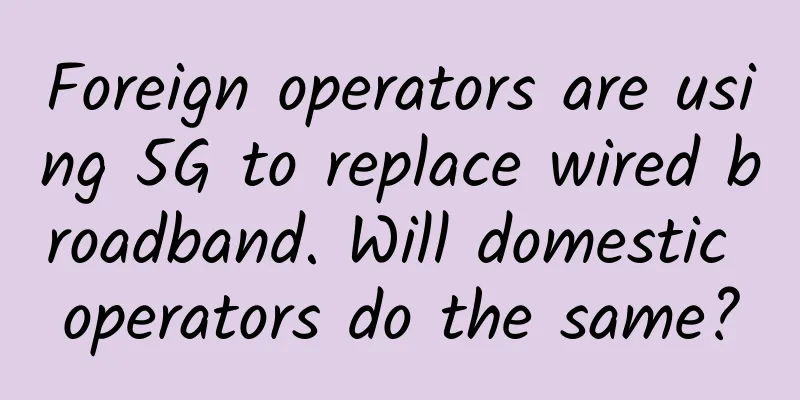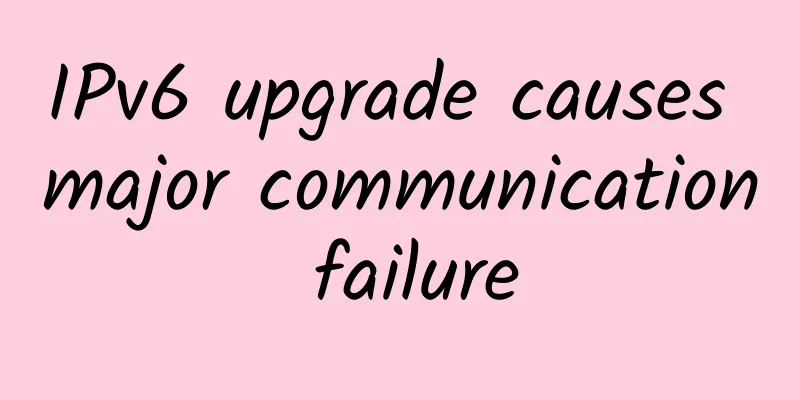Understand 5G in one article: Will it subvert the sky-high living costs?

|
When we were still accustomed to browsing the web slowly with non-smart phones, 3G network came quietly. When we thought 3G could meet our daily needs, 4G had already entered our lives. And when we are still amazed at the speed of 4G to this day, the even faster 5G seems to be on the way.
A while ago, a promotional video called "What is Peppa Pig" went viral on the Internet. The village was isolated from the public, and the grandfather didn't know what Peppa Pig was. So he put on his reading glasses and looked up the dictionary, but still couldn't figure it out. For us, the concept of 5G is the same. We can say that we have only heard of it, but don't know its actual meaning. So the question is, what exactly is 5G? What is 5G? On Qualcomm's 5G website, we can see the following description: "5G is the foundation of the future." This future sounds very macro, and may even spawn another "100,000 Whys," such as "What will the future be like?" and "Why will 5G change the future?" So I decided not to dwell on this issue first, and to start from the surface. The so-called 5G, in simple terms, is the fifth generation of mobile networks, which are mainly faster than 4G, have lower network latency, and are more widely used. Does 4G have to be replaced by 5G? Let's first talk about the speed that we can feel most easily. We know that after several years of construction, 4G networks have basically been widely popularized. It can be said that it is very enjoyable to use, but! Here's the key point, but can the 4G network always ignore the environment and download small movies at a few megabytes? No! When the number of devices in the same base station is very large, the actual usage rate of 4G may not be as good as HSPA+. This is why many times when we are watching concerts or football games, we want to use 4G network to post a circle of friends to show off, but we can't. The root cause is that the highest frequency carrier of the 4G band is limited. The highest frequency carrier of the 4G band is around 2GHz, and the available spectrum bandwidth is only 100MHz. In comparison, the 28GHz band and the 60GHz band (millimeter wave band) are the two bands most likely to be used in 5G. The available spectrum bandwidth of the 28GHz band can reach 1GHz, while the available signal bandwidth of each channel in the 60GHz band reaches 2GHz. What? Too professional to understand? It doesn’t matter if you don’t understand. You just need to know that the spectrum bandwidth of the 5G band is easily 10 times that of the 4G band. Hearing this, some friends with some thinking ability may raise their hands and ask questions again, "So what if it is 10 times? I won’t encounter network congestion every day. If I encounter it, I can just endure it~" Indeed, at present, the 4G frequency band network is indeed sufficient to cope with it, but if you can look to the future, imagine that the number of electronic devices in our homes is increasing. The rise of smart homes has made many people think of renovating old things, and even implemented it. These devices need to be connected to the Internet. Looking forward to the next ten years, the number of various connected devices will increase exponentially. If the network level is still like this, can you still say "it will pass"? In short, 4G cannot afford the huge amount of data and networking needs in the future, so don't miss it anymore, 4G is gone! How fast is 5G? Back to 5G, we know that 5G has a larger bandwidth, but what about the speed? According to the IMT-2020 requirements, the peak data transmission rate of 5G is expected to be as high as 20Gbps, and the peak transmission rate can even reach 25Gbps. What is the concept of 25Gbps? According to Russian operator MTS, all its users spent a total of 1206Pb of transmission traffic in 2016. If calculated based on the transmission speed of 25Gbps, it only takes 18 days to transmit this 1206Pb of traffic, including streaming movies, video calls, surfing the Internet, downloading and transmitting media files, etc.
Are you confused again? Don't worry, let's keep it simple. 25Gbps is the abbreviation of 25GBits bits per second, which means 25G bits per second, and 1byte=8bits, so the actual rate of 25Gbps = 25/8=3.125GBps. Everyone should understand it here, so the download rate is about 3.125GB per second. This is also the reason why many advertisements claim that using 5G can download high-definition movies in seconds. However! Let me emphasize again, this speed may be too fast for everyone to bear. You know, our currently most used SATA 3 hard drive has a peak write speed of only 600MB/s. Even the most advanced NVMe SSD has a peak write speed of only about 1.5GB/s. So, theoretically speaking, even if 5G comes, we cannot currently bring out its full performance. What other changes will 5G bring? Having said that, I think I can talk about the widespread application of 5G. 5G not only has wider bandwidth and faster speed, but also has lower latency, which is amazing. You should all know about VR, which is the kind of device that makes most people vomit after playing games for more than half an hour, and also makes people feel uncomfortable because of the restraint of the wires. Now I want to say that if 5G comes, these symptoms will not exist! Currently, the main reason why VR devices cause people dizziness is that the image quality is too low and the delay is too high due to the transmission rate of the device. There is a lag and conflict between the picture in your eyes and the actual action, which makes the brain nerves always in an illusion. If you play for a long time, the brain will naturally protest, and you will feel dizzy. The high transmission rate and low latency of 5G allow the device to transmit 8K high-definition images in real time, and at the same time have enough power to render realistic scenes. The low latency can even achieve millimeter-precise operations, and even remote control can be done as if it were an arm. Speaking of this, the topic of telemedicine has been derived. I will not expand on it here. You can YY the beautiful life in the future. You can enjoy expert remote services without having to make an appointment with an expert. Isn’t it so cool? Back to VR, due to the high wireless bandwidth of 5G, VR devices no longer need to be connected by wires. Getting rid of constraints is equivalent to breaking through the bottleneck. What will naturally follow is a blowout development, which should be the most intuitive change. Of course, in addition to VR, 5G can also bring more ideas to the Internet of Things, the most basic artificial intelligence, 5G's high bandwidth and high speed can bring stronger real-time computing capabilities. To give the simplest example, when you go abroad, you still have to wait for the translation after speaking with translation software. Then, after the arrival of 5G, it is very likely that there will be software that can do simultaneous interpretation. It is a real change. Are you afraid? In addition, there are many other directions for expansion. For example, 5G may provide guarantees for the realization of autonomous driving. Of course, if you drive illegally, the efficiency of electronic eyes to shoot you may also be higher... In fact, if you are good at thinking, you should be able to think of many expansions of 5G applications, not only between people and things, but also between things. Some of what I just mentioned may be just a drop in the bucket, just to open up a way of thinking for everyone. What I want to express is that the arrival of 5G can really change our future lives. Seeing this, I believe no one will question it. How long will 5G take to arrive? Having said so much, when will 5G come? What is the progress? In fact, my country's three major operators have accelerated the pace of popularizing 5G. However, since 5G cannot be upgraded through 4G base stations, base stations basically have to be laid from scratch. The workload can be imagined. Next, let's take a look at the progress of the three major operators. 1. China Mobile In terms of 5G, China Mobile should be regarded as the fastest in China, which is similar to the situation when 4G was just applied. Last year, China Mobile announced that it would build the world's largest 5G experimental network and conduct field tests in five cities, including Hangzhou, Shanghai, Guangzhou, Suzhou and Wuhan. Each city will build more than 100 5G base stations; 5G business and application demonstrations will be carried out in 12 cities including Beijing, Tianjin, Chengdu and Shenzhen. It is expected that digital data products supporting 5G will be released in the first half of 2019. 2. China Unicom As for China Unicom, it is also quite active in the 5G competition, and it has already regarded 5G as the key to overtaking others. Wang Xiaochu, chairman of China Unicom, once said that we must seize the opportunity when 5G arrives. Last year, China Unicom released seven new products including cloud networking, cloud networking, and cloud broadband at a new product launch conference, and announced its future 5G development plan. It also started the 5G network experiment last year, which will be used in 2019 and is expected to be popularized in 2020. 3. China Telecom *** Let's look at China Telecom. At the 2018 Shanghai Mobile World Congress, China Telecom released the "China Telecom 5G Technology White Paper", announcing that as a builder and operator of national information infrastructure, China Telecom will unswervingly implement the national strategy of building a strong network and 5G, and fully promote the development of 5G from the two aspects of technological innovation and industrial cooperation. China Telecom has also started 5G trials in many cities, and will conduct trial commercial use in 2019, and is expected to begin popularization in 2020. Judging from the current attitudes of the three major operators, they naturally hope that 5G can be popularized as soon as possible. However, since the penetration of 5G network is weaker than that of 4G, the requirements for base stations have become higher. It can be imagined that if 5G is to be popularized, the distribution density of 5G base stations must be very high, and it may even be necessary to have one terminal in one building. The amount of engineering may be beyond imagination. I think even if 5G is officially put into operation, the first place that can be experienced must be the core areas of first-tier cities. It will probably take a few years to achieve full popularization. Should we change our SIM cards when 5G comes? Well, facing the temptation of 5G, I am willing to wait for it for a while, but what preparations do we need to make in advance for 5G? After searching in many places, I found that we don’t need to do anything for the time being. China Mobile has cooperated with ZTE to realize the first 5G phone call in China, and China Mobile has also conducted scientific popularization on this. Due to the particularity of 5G, we must have a 5G device to bring out its performance, but the good news is that we don’t need to change the mobile phone card, so before 5G comes, we just need to wait patiently, and then we can change the device and it will be done.
With the arrival of 5G, will the charges be sky-high? ***Let's talk about the charges. As we said before, if 5G wants to be popularized, operators need to lay a large number of new base stations, which will lead to an increase in costs. Even at the request of the Ministry of Industry and Information Technology, the three major domestic operators in the 4G era have implemented some people-friendly measures including "speeding up and reducing fees" and "cancelling traffic fees". However, in the early stages of 5G, I believe that traffic charges will not be people-friendly, at least they should not be more favorable than the current 4G charges. Even if 5G traffic charges are lower than 4G, due to the increase in download speed, the total amount of traffic used by users will also increase simultaneously, so the total cost will not decrease. The popularization of 5G is a long process. If you want to try it in advance, you will naturally have to pay more costs. This is true for both operators and users. Having said so much, I believe everyone should have a basic understanding of 5G. Although there are more and more 5G-related content on the Internet, giving people a feeling that 5G is coming soon, but if you think about it carefully, you will find that 5G may still be some distance away from us. At this stage, there are still too many obstacles affecting its full popularization. After understanding 5G, we still have to eat and drink, and then wait patiently. |
<<: How does the redundancy function of Industrial Ethernet ensure the stability of the network?
>>: If there is a problem with IT asset audit, I will ask you whether you are afraid or not.
Recommend
Vice President of Huawei Cloud BU: We want to be the promoter of enterprise digital transformation
[51CTO.com original article] When it comes to pub...
Master the knowledge of optical modules in one article and become a necessary skill for network engineers
In this era of information explosion, data transm...
How network segmentation strategies work with SD-WAN
Software-defined WANs (SD-WANs) have sparked a re...
“Number Portability” is officially launched nationwide today! Who will be the next “pain point” to be solved?
Yesterday, the national "number portability&...
The country's first Wi-Fi 6 subway is built! Tired of hearing about 5G? Let's learn about the 6th generation of WiFi!
Recently, Shenzhen Metro Futian Hub became the fi...
Will broadband market operators monopolize the market? Private capital faces difficulties
On November 26, 2014, the Ministry of Industry an...
BandwagonHost: CN2 VPS annual payment starts from $46.7, 2.5-10Gbps bandwidth CN2 GIA line quarterly payment starts from $46.7
Bandwagonhost currently has most packages availab...
2G/3G will be phased out soon, and NB-IoT will start to take over
With the upcoming decommissioning of 2G/3G networ...
Industry applications are so attractive, so why can’t we get a taste of 5G networks?
Taking stock of the sources of growth in operator...
Analysis of the advantages and disadvantages of the six categories of wireless connection technologies for the Internet of Things
IoT applications have penetrated into our lives, ...
Qualcomm: The invention of these key technologies has driven the expansion of 5G!
Today, we are in the process of rapidly expanding...
Anti-unified prescriptions ensure the security of prescription data and promote the healthy development of the medical industry
Hospitals can be said to be places closely relate...
In addition to the ping command, these network commands are also very useful
What we are going to talk about today is other co...
If you think 5G will solve all your IoT challenges, think again
5G stands for the next generation of mobile commu...


![[11.11] Megalayer: 60% off Hong Kong/US high-defense servers, 60% off Hong Kong Alibaba/Huawei cloud hybrid servers, US servers 199 yuan/month](/upload/images/67cabd292c61f.webp)






